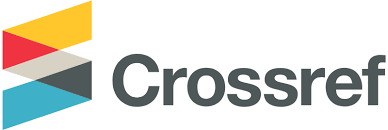AGENTIC ENGAGEMENT PESERTA DIDIK SELAMA PEMBELAJARAN DARING: PENGARUH MOTIVASI INTRINSIK DAN PERCEIVED TEACHER AUTONOMY SUPPORT
Abstrak
Pandemi COVID-19 berdampak kepada pelaksanaan pembelajaran di sekolah. Berdasarkan kebijakan pemerintah tentang pelaksanaan pendidikan sekolah dasar hingga perguruan tinggi, perubahan pembelajaran tatap muka di sekolah selama masa pandemi menjadi belajar dari rumah (BDR) diterapkan pada seluruh tingkat pendidikan melalui pembelajaran jarak jauh (PJJ) secara daring. Peserta didik membutuhkan adaptasi untuk melakukan PJJ agar tetap terjaga keterlibatannya selama proses pembelajaran. Keterlibatan belajar peserta didik dalam PJJ, membutuhkan adanya interaksi secara timbal balik antara guru dan peserta didik, yang disebut sebagai agentic engagement. Penelitian ini bertujuan untuk mengetahui pengaruh motivasi intrinsik dan perceived teacher autonomy support yang dipersepsikan peserta didik terhadap agentic engagement dalam PJJ pada masa pandemi COVID-19. Penelitian ini menggunakan pendekatan kuantitatif dengan teknik non-probability sampling. Partisipan penelitian ini adalah sejumlah 333 peserta didik tingkat SMA Negeri kelas XII di Jakarta, Bogor, Depok, Tangerang, dan Bekasi (Jabodetabek). Alat ukur yang digunakan yaitu Agentic Engagement Scale, Questionnaire Motivation Dimension, dan Learning Climate Questionnaire. Analisis regresi berganda dengan menggunakan IBM Statistic Package for Social Science (IBM SPSS Statistic Version 26.0) menunjukkan bahwa agentic engagement dapat diprediksi oleh motivasi intrinsik dan perceived teacher autonomy support sebesar 34.5% (R2 = .345, p < .05). Untuk dapat terlibat secara aktif dan berkontribusi dalam PJJ, peserta didik diharapkan memiliki motivasi yang sifatnya internal dan mempersepsikan adanya dukungan otonomi dari guru dalam belajar.
Kata Kunci
Teks Lengkap:
PDFReferensi
Al Khumaero, L., & Arief, S. (2018). Pengaruh gaya mengajar guru, disiplin belajar, dan teman sebaya terhadap prestasi belajar. Economic Education Analysis Journal, 6, (3), 698-710.
Balfanz, R., Herzog, L., & Mac Iver, D. J. (2007). Preventing student disengagement and keeping students on the graduation path in urban middle-grades schools: Early identification and effective interventions. Educational Psychologist, 42 (4), 223-235. https://doi.org/10.1080/00461520701621079
Benlahcene, A., Hashim, A. R., Kaur, A., & Wan-Din, W. (2021). Perceived autonomy support and agentic engagement among Malaysian undergraduates: The mediatory role of personal best goals. Journal of Further and Higher Education, 1-13. https://doi.org/10.1080/0309877x.2021.1879743
Chiu, T. K. F. (2022). Applying the self-determination theory (SDT) to explain student engagement in online learning during the Covid-19 pandemic. Journal of Research on Technology in Education, 54(S1), S14–S30. https://doi.org/10.1080/15391523.2021.1891998
Cahya, L. (2020). Pengaruh Gaya Mengajar Guru terhadap Motivasi Belajar Siswa Kelas 3 SDN Ngebruk 01 Kecamatan Poncokusumo Kabupaten Malang. Seminar Nasional Pendidikan Guru Sekolah Dasar Universitas PGRI Kanjuruhan Malang (pp.461-471). Malang, Indonesia: Fakultas Pendidikan Guru Sekolah Dasar, Universitas PGRI Kanjuruhan Malang.
Deci, E. L., Olafsen, A. H., & Ryan, R. M. (2017). Self Determination Theory in Work Organizations: The State of a Science. Annual Review of Organizational Psychology and Organizational Behavior, 4, (1), 19-43. doi:10.1146/annurev-orgpsych-032516-113108
Dong, Y., Liu, S. (2020). An Investigation into Students’ Agentic Engagement in Online English Listening Learning. Journal of Language Teaching and Research, 11 (3), 409-417. DOI: http://dx.doi.org/10.17507/jltr.1103.09
Fatimah, L., Saptandari, L. (2022). Peran growth mindset dan dukungan orang tua terhadap keterlibatan siswa selama Pembelajaran daring. Persona: Jurnal Psikologi Indonesia, 11, (1), 58-73. https://doi.org/10.30996/persona.v11i1.5773
Fredricks, J. A., Blumenfeld, P. C., & Paris, A. H. (2004). School engagement: Potential of the concept, state of the evidence. Review of Educational Research, 74, (1), 59-109. https://doi.org/10.3102/00346543074001059
Froiland, J. M., Davison, M. L., & Worrell, F. C. (2016). Aloha teachers: Teacher autonomy support promotes Native Hawaiian and Pacific Islander students’ motivation, school belonging, course-taking, and math achievement. Social Psychology of Education, 19, (4), 879-894.
Froiland, J., Oros, E., Smith, L., & Hirchert, T. (2012). Intrinsic motivation to learn: The nexus between psychological health and academic success. Contemporary School Psychology, 16, 91–101.
Gravetter, F. J., & Forzano, L. B. (2018). Research methods for the behavioral sciences. (6th ed.). Canada: Cengage Learning.
Hafen, C. A., Allen, J. P., Mikami, A. Y., Gregory, A., Hamre, B., & Pianta, R. C. (2012). The pivotal role of adolescent autonomy in secondary school classrooms. Journal of Youth and Adolescence, 41, 245-255. https://doi.org/10.1007/s10964-011-9739-2
Hart, C. M., Berger, D., Jacob, B., Loeb, S., & Hill, M. (2019). Online learning, offline outcomes: Online course taking and high school student performance. AERA Open, 5, (1), 1-17. https://doi.org/10.1177/2332858419832852
Jang, H., Reeve, J., & Deci, E. L. (2010). Engaging students in learning activities is not autonomy support or structure but autonomy support and structure. Journal of Educational Psychology, 102, (3), 588-600. https://doi.org/10.1037/a0019682
Kaplan, R.M., Saccuzzo, D. P. (2013). Psychological Testing: Principles, Applications, and Issues. (9th ed). Boston: Cengage Learning.
Kang, H. (2021). Sample size determination and power analysis using the G*Power software. Journal of Educational Evaluation for Health Professions, 18, 17. https://doi.org/10.3352/jeehp.2021.18.17
Kementerian Pendidikan dan Kebudayaan Republik Indonesia. (2020). Surat Edaran Nomor 15 Tahun 2020 Tentang Pedoman Penyelenggaraan Belajar dari Rumah dalam Masa Darurat Penyebaran Coronavirus Disease (Covid-19).
Khunaini, N., & Sholikhah, N. (2021). Pengaruh Penggunaan Learning Management System Google Classroom dan Gaya Mengajar Guru Terhadap Motivasi Belajar pada Pembelajaran Daring. Jurnal Ilmu Pendidikan, 3, (5), 2079-2091. https://doi.org/10.31004/edukatif.v3i5.737
Kuh, G. D. (2001). Assessing what really matters to student Learning: Inside the national survey of student engagement. Change: The Magazine of Higher Learning, 33, (3), 10-17. https://doi.org/10.1080/00091380109601795
Kuh, G. D. (2003). What we're learning about student engagement from NSSE: Benchmarks for effective educational practices. Change: The Magazine of Higher Learning, 35, (2), 24-32. https://doi.org/10.1080/00091380309604090
Kuh, G. D. (2009). What student affairs professionals need to know about student engagement. Journal of College Student Development, 50, (6), 683-706. https://doi.org/10.1353/csd.0.0099
Kurt, U., & Tas, Y. (2018). The relationships between parental involvement, students’ basic psychological needs and students’ engagement in science: A path analysis. Journal of Education in Science, Environment, and Health, 4(2), 183-192. https://doi.org/10.21891/jeseh.436730
Kusumadewi, K. D. (2022). Peran motivasi terhadap keterlibatan agentik peserta didik kelas XII SMA Negeri dalam pembelajaran jarak jauh (PJJ) di Jabodetabek. Skripsi. Program Sarjana Universitas Indonesia Depok.
Lei, H., Cui, Y., & Zhou, W. (2018). Relationships between student engagement and academic achievement: A meta-analysis. Social Behavior and Personality: an international journal, 46, (3), 517-528. https://doi.org/10.2224/sbp.7054
Legault, L. (2017). Self-Determination Theory. Encyclopedia of Personality and Individual Differences, 1-9. https://doi.org/10.1007/978-3-319-28099-8_1162-1
Louwrens, N., & Hartnett, M (2015). Student and teacher perceptions of online student engagement in an online middle school. Journal of Open, Flexible and Distance Learning, 19, (1), 27–43.
Maulana, R., Opdenakker, M. C., den Brok, P., & Bosker, R. (2011). Teacher–student interpersonal relationships in Indonesia: profiles and importance to student motivation. Asia Pacific Journal of Education, 31, (01), 33-49.
Montenegro, A. (2017). Understanding the Concept of Student Agentic Engagement for Learning. Colombian Applied Linguistics Journal, 19, (1), 117-128. https://doi.org/10.14483/calj.v19n1.10472
Murayama, K., Pekrun, R., Lichtenfeld, S., & Vom Hofe, R. (2013). Predicting long-term growth in students’ mathematics achievement: The unique contributions of motivation and cognitive strategies. Child Development, 84 (4), 1475–1490. http://doi.org/10.1111/cdev.12036.
Nirwana, & Muhlis. (2020). Students’ social presence and perceived learning toward cross-cultural: An understanding course in the online classroom (an evaluation of the learning process during the pandemic Coronavirus). Elite Journal, 7, (1), 61–73.
Pratama, M. (2019). Peran dukungan otonomi guru terhadap prestasi belajar matematika siswa. Jurnal Riset Aktual Psikologi, 10, (2), 182. https://10.24036/rapun.v10i2.106675
Purwanto, A. (2020). The Impacts of Leadership and Culture on Work Performance in Service Company and Innovative Work Behavior As Mediating Effects. Journal of Research in Business, Economics, and Education, 2, (1), 283-291.
Putri, V. J., Subarno, A., & Susantiningrum. (2019). Pengaruh Gaya Mengajar Guru Dan Perhatian Orang Tua Terhadap Motivasi Belajar Siswa Di Smk Batik 1 Surakarta. Jurnal Informasi Dan Komunikasi Administrasi Perkantoran, 3, 32–39.
Reeve, J., & Tseng, C. (2011). Agency as a fourth aspect of students’ engagement during learning activities. Contemporary Educational Psychology, 36, (4), 257-267. https://doi.org/10.1016/j.cedpsych.2011.05.002
Reeve, J. (2012). Handbook of research on student engagement. New York: Springer Science + Business Media.
Reeve, J. (2013). How students create motivationally supportive learning environments for themselves: The concept of agentic engagement. Journal of Educational Psychology, 105, 579–595. https://doi.org/10.1037/a0032690
Reeve, J., & Shin, S. (2020). How teachers can support students’ agentic engagement. Theory Into Practice, 59, (2), 150-161. https://doi.org/10.1080/00405841.2019.1702451
Rohinsa, M., Djunaidi., & Cahyadi, S. (2019). Peran teacher autonomy support terhadap engagement siswa melalui pemenuhan kebutuhan psikologis dasar. Jurnal Psikologi, 15, (2). http://dx.doi.org/10.24014/ jp.v14i2.7423
Rahmawati, & Putri, E. M. I. (2020). Learning from home dalam perspektif persepsi mahasiswa era pandemi Covid-19. Seminar Nasional Hardiknas (pp.17–24). Bojonegoro, Indonesia: Prodi D3 Keperawatan, Sekolah Tinggi Ilmu Kesehatan Rekejwesi Bojonegoro.
Ryan, R. M., & Deci, E. L. (2017). Self-determination theory: Basic psychological needs in motivation, development, and wellness. New York: Guilford Press.
Ryan, R. M., & Deci, E. L. (2000). Self-determination theory and the facilitation of intrinsic motivation, social development, and well-being. American Psychologist, 55, (1), 68-78. https://doi.org/10.1037/0003-066x.55.1.68
Salsabila, A. (2012). Hubungan antara dukungan kemandirian dari guru dan keterlibatan peserta didik dalam belajar. Skripsi. Program Sarjana Universitas Indonesia Depok.
Saptoyo, R. D. A. (2021). 7 Hari PPKM Darurat, Mobilitas Masyarakat Turun hingga 15 persen. Kompas.Com. https://www.kompas.com/tren/read/2021/07/13/111053565/7-hari-ppkm-darurat-mobilitas-masyarakat-turun-hingga-15-persen?page=all
Shernoff, D. J., Kelly, S., Tonks, S. M., Anderson, B., Cavanagh, R. F., Sinha, S., & Abdi, B. (2016). Student engagement as a function of environmental complexity in high school classrooms. Learning and Instruction, 43, 52-60. https://doi.org/10.1016/j.learninstruc.2015.12.003
Skinner, E. A., & Pitzer, J. R. (2012). Handbook of Research on Student Engagement. New York: Springer Science.
Ursachi, G., Horodnic, I. A., & Zait, A. (2015). How reliable are measurement scales? External factors with indirect influence on reliability estimators. Procedia Economics and Finance, 20, 679-686. https://doi.org/10.1016/s2212-5671(15)00123-9
Williams, G. C., & Deci, E. L. (1996). Internalization of biopsychosocial values by medical students: A test of self-determination theory. Journal of Personality and Social Psychology, 70, (4), 767-779. https://doi.org/10.1037/0022-3514.70.4.767
Winstone, N. E., Nash, R. A., Parker, M., & Rowntree, J. (2017). Supporting learners' agentic engagement with feedback: A systematic review and a taxonomy of recipience processes. Educational Psychologist, 52, (1), 17-37. https://doi.org/10.1080/00461520.2016.1207538
DOI: https://doi.org/10.24198/jpsp.v7i1.44880
Refbacks
- Saat ini tidak ada refbacks.
##submission.copyrightStatement##
##submission.license.cc.by-sa4.footer##
Jurnal ini terideks di:













